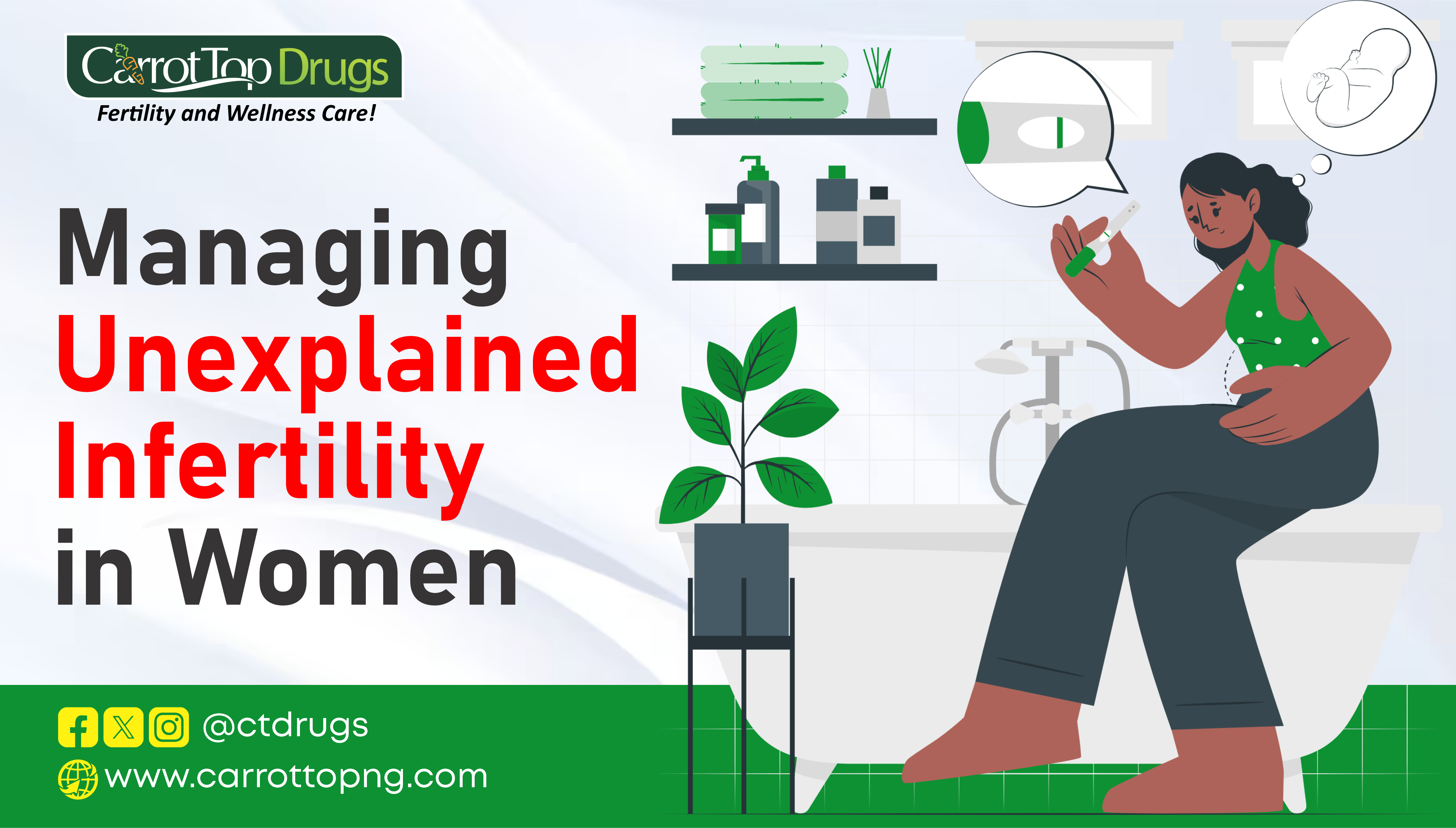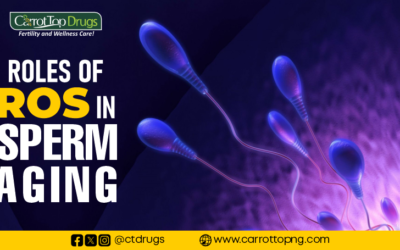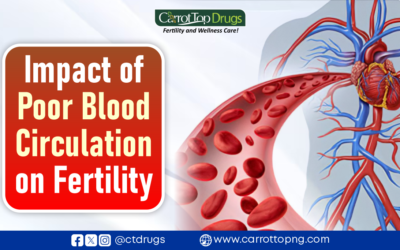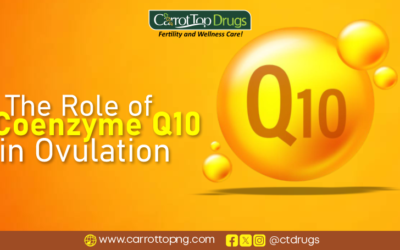Introduction
Infertility is a challenging journey for many couples, and when it comes to unexplained infertility in women, the path can be even more perplexing. Unexplained infertility is a type of infertility whose cause remains unknown even after all the known infertility investigations have been done. In this article, we will look into the various aspects of managing unexplained infertility, understand its impact, and explore the medical approaches to enhance fertility.
Prevalence of Unexplained Infertility In Women
In a research conducted by R Isaksson et al., around 10-20% of couples struggle with unexplained infertility in women. According to research conducted by Jessica Ka-Yan Man et al., unexplained infertility accounts for about 25% of all cases. The research also says that about 1 in every 7 couples are struggling with unexplained infertility. This means that even though doctors check for common reasons why someone might have trouble getting pregnant, they can’t find a specific cause in these cases. It shows that having a baby is complex, and sometimes we don’t fully understand why it’s challenging for certain couples.
Is It Possible For A Woman With Unexplained Infertility To Get Pregnant?
Having unexplained infertility in women doesn’t rule out the possibility of getting pregnant. Women facing unexplained infertility have successfully become pregnant, often with the assistance of fertility treatments or by making adjustments to their lifestyle.
In a research conducted by R Isaksson et al., unexplained infertility is not an absolute condition but rather a relative inability to conceive, and many of these couples may conceive without treatment. The research also revealed that treatment results are promising. Hence, it is not a completely hopeless situation.
Some Possible Causes of Unexplained Infertility In Women
Hormonal Imbalances:
Unexplained infertility in women can be influenced by undetected hormonal imbalances. Irregularities in hormone levels, even within the normal range, may impact the delicate interplay required for successful conception. These subtle imbalances, not readily apparent in routine tests, can contribute to unexplained infertility.
Ovulatory Disorders:
Some women experiencing unexplained infertility may have underlying ovulatory disorders. Despite regular menstrual cycles, subtle irregularities in ovulation timing or function may exist, affecting the chances of conception. Exploring these aspects becomes crucial in understanding the complexities associated with unexplained infertility in women.
Endocrine Disorders:
Undiagnosed endocrine disorders can play a role in unexplained infertility. Conditions affecting the endocrine system, such as thyroid disorders or polycystic ovary syndrome (PCOS), may influence reproductive health without clear indications in routine assessments.
Uterine Abnormalities:
Unseen anomalies within the uterus, such as polyps or fibroids, could contribute to unexplained infertility in women. Even with standard evaluations, these structural issues may go unnoticed, highlighting the need for more specialized diagnostic tools like hysteroscopy to uncover potential factors impacting fertility.
Immunological Factors:
Unexplained infertility may be linked to subtle immune system factors affecting the reproductive process. Immune responses that go undetected in routine tests may influence the chances of conception.
Genetic Factors:
Underlying genetic conditions may contribute to unexplained infertility in women. While routine genetic screenings may not reveal all potential issues, advanced genetic testing can provide insights into genetic factors impacting reproductive health.
Chronic Inflammation:
Chronic inflammation within the reproductive organs may be a factor in unexplained infertility. Inflammatory conditions, not easily identified through routine tests, can disrupt the optimal environment needed for conception. Addressing and managing chronic inflammation becomes integral in the management of unexplained infertility in women.
Undetected Infections
Unexplained infertility may be associated with undetected infections impacting reproductive health. These infections, which might not be evident in routine assessments, can interfere with fertility. Exploring potential infectious factors is essential in understanding the complexities of unexplained infertility in women.
Endometriosis
Unexplained infertility in women may, in some cases, be attributed to endometriosis, a medical condition that occurs when tissue similar to the lining of the uterus grows outside the womb. This condition often leads to pelvic pain, heavy menstrual bleeding, and discomfort during intercourse. When endometriosis affects the reproductive organs, it can hinder the normal functioning of the ovaries, fallopian tubes, and uterus, potentially contributing to difficulties in conceiving.
Poor Cervical Mucus
Unexplained infertility in women may be linked to poor cervical mucus, a crucial component of the reproductive process that plays a vital role in facilitating sperm movement and fertilization. Cervical mucus provides a conducive environment for sperm to navigate through the female reproductive tract, aiding their journey towards the egg.
Poor Egg Quality
Unexplained infertility in women can sometimes be attributed to poor egg quality, a critical factor influencing the success of conception. Poor egg quality refers to eggs that may have abnormalities, making it more difficult for them to be fertilized and develop into a healthy embryo.
Uterine Lining
Unexplained infertility in women may be associated with issues related to the uterine lining, a crucial element in the fertility journey. The uterine lining, or endometrium, plays a vital role in supporting embryo implantation and early pregnancy development.
Poorly Timed Sexual Intercourse
Unexplained infertility in women may be connected to poorly timed intercourse, a factor that significantly influences the likelihood of conception. Poorly timed intercourse refers to couples having difficulty conceiving due to not aligning sexual activity with the woman’s fertile window.
Diagnosis
In order to come to the conclusion of unexplained infertility, there are several investigations that the physician should conduct. Here are some of them:
Medical History Review:
Understanding a woman’s complete medical history is the first step in diagnosing unexplained infertility. This process involves looking into past illnesses, surgeries, or conditions that might impact fertility.
Menstrual Cycle Evaluation:
Assessing the regularity and characteristics of a woman’s menstrual cycle is crucial. Irregularities may indicate hormonal imbalances or ovulatory disorders linked to unexplained infertility in women. This investigation helps healthcare professionals understand the nuances of the reproductive cycle.
Ovulation Tracking:
Monitoring ovulation through methods like tracking basal body temperature or using ovulation predictor kits provides insights into the timing of ovulation. This investigation helps rule out issues related to irregular or absent ovulation, contributing to the understanding of unexplained infertility in women.
Semen Analysis:
A thorough examination of the male partner’s semen is vital in assessing fertility. While unexplained infertility focuses on women, understanding male factor infertility is essential. This is to rule out infertility in the male partner.
Fallopian Tube Assessment:
Evaluating the health and functionality of the fallopian tubes is crucial. Issues in the tubes, such as blockages, may impact the transport of eggs and sperm, contributing to unexplained infertility in women. This investigation involves procedures like an HSG (hysterosalpingography) or laparoscopy.
Uterine Evaluation:
Assessing the health of the uterus is important. Structural abnormalities or conditions within the uterus, like fibroids or polyps, may contribute to unexplained infertility in women. Evaluations may involve imaging techniques like ultrasound or more invasive procedures like hysteroscopy.
Hormonal Assessments:
Checking hormone levels, including those related to ovarian function, thyroid health, and other reproductive hormones, helps identify potential imbalances.
Genetic Screening:
Exploring genetic factors through screening can reveal any underlying conditions that may impact fertility. This investigation recognizes the importance of a holistic approach to understanding unexplained infertility in women, including genetic influences on reproductive health.
Lifestyle and Environmental Factors:
Investigating lifestyle factors such as diet, exercise, stress levels, and exposure to environmental toxins is vital. These factors may contribute to unexplained infertility in women.
Cervical Mucus Assessment:
Analyzing the quality of cervical mucus is essential in understanding fertility. Poor cervical mucus can impact sperm movement, contributing to unexplained infertility in women. This investigation involves assessing the characteristics of cervical mucus throughout the menstrual cycle.
Other investigations that the physician may want to carry out are:
- An evaluation of the immune system
- Endometrial biopsy
- Ovarian reserve testing using Anti-Mullerian Hormone, Antral Follicle Count, Basal Follicle-Stimulating Hormone (FSH) Testing, Clomiphene Citrate Challenge Test (CCCT), etc.
Treatment Options of Unexplained Infertility in Women
Ovulation Induction:
Ovulation induction is a medical treatment for unexplained infertility in women aimed at stimulating the ovaries to release eggs. Fertility medications, such as Clomiphene citrate or Letrozole, may be prescribed to enhance ovulation, increasing the chances of conception. Ovumine is our very own Clomid and should be taken with specifications from your health care provider.
Intrauterine Insemination (IUI):
In cases of unexplained infertility, IUI may be recommended as a treatment option. This involves placing sperm directly into the uterus during the woman’s fertile window, optimizing the chances of sperm reaching and fertilizing the egg. IUI is often combined with ovulation induction to enhance the overall success rate.
In Vitro Fertilization (IVF):
IVF is a more advanced medical intervention for unexplained infertility in women. This procedure involves retrieving eggs from the ovaries, fertilizing them with sperm in a laboratory setting, and transferring the resulting embryos into the uterus. IVF provides a comprehensive approach to fertility treatment, bypassing potential unexplained factors hindering conception.
Lifestyle Modifications:
While not a traditional medical treatment, lifestyle modifications play a crucial role in addressing unexplained infertility in women. Optimizing factors like diet, exercise, and stress management can positively impact fertility outcomes.
Hormonal Therapies:
Hormonal therapies, such as gonadotropins, may be utilized to regulate and enhance ovarian function. These medications can stimulate the ovaries to produce multiple eggs, increasing the chances of successful conception. Hormonal therapies are often integrated into treatment plans for unexplained infertility.
Endometrial Receptivity Analysis (ERA):
ERA is a specialized diagnostic tool that assesses the receptivity of the uterine lining. In cases of unexplained infertility, determining the optimal timing for embryo implantation becomes crucial. ERA helps personalize the timing of embryo transfer during IVF, enhancing the chances of successful pregnancy.
Preimplantation Genetic Testing (PGT):
PGT is an advanced genetic screening technique used in conjunction with IVF. This testing assesses the genetic health of embryos before implantation, minimizing the risk of chromosomal abnormalities. In cases of unexplained infertility, PGT can contribute to improving the overall success rates of fertility treatments.
Regular Health Check-ups:
Regular health check-ups and screenings are essential lifestyle modifications for women with unexplained infertility. These check-ups can help identify and address any underlying health issues that may contribute to fertility challenges. Proactive healthcare is a crucial aspect of the comprehensive approach to unexplained infertility in women.
Fertility-Friendly Lubricants:
For couples trying to conceive, using fertility-friendly lubricants can be a beneficial lifestyle modification. Standard lubricants may hinder sperm movement, and choosing fertility-friendly alternatives aligns with efforts to enhance the chances of conception in the context of unexplained infertility in women. One such fertility-fertility lubricant is Pre Seed Lubricant For TTC Couples
Supplements
Supplements can help with unexplained infertility in women. However, it is necessary to contact your healthcare provider. Evergreen Formular for Women is a supplement that can be used for dietetic management of idiopathic infertility in women. It contains antioxidants like Vitamins A, C, E, B1, B2, B3, B6, B12, Vitamin D3, Folic Acid, and Vitex. For problems with the cervical mucus, we recommend Evergreen CM helps to increase the cervical secretions during the ovulatory phase and induce endometrial secretion during implantation.
Women with poor egg quality need supplements with the necessary nutrients that can help in boosting egg quality. Some of these nutrients are Folic acid, myo-inositol, melatonin, Vitamin E, Coenzyme Q10, Grapeseed extract and Alpha lipoic acid. This helps to not only relieve the impact of oxidative stress on the eggs but also improve quality. All these nutrients and more are found in our Evergreen Eggboost for Women.
Conclusion
In conclusion, managing unexplained infertility in women requires a holistic approach that considers both physical and emotional well-being. Whether exploring lifestyle changes, holistic therapies, or medical interventions, the journey is unique for each individual. Remember, seeking professional advice and building a strong support system are key components of this journey.
FAQs
Q. Is unexplained infertility common?
A. Unexplained infertility accounts for approximately 10-20% of infertility cases.
Q. Can stress really impact fertility?
A. Yes, chronic stress can affect hormonal balance, potentially impacting fertility.
Q. Are herbal supplements safe for managing unexplained infertility?
A. It’s crucial to consult with a healthcare professional before incorporating herbal supplements.
Q. How long should one try before seeking medical intervention for unexplained infertility?
A. Generally, if conception doesn’t occur after one year of trying, it’s advisable to seek professional advice.

















